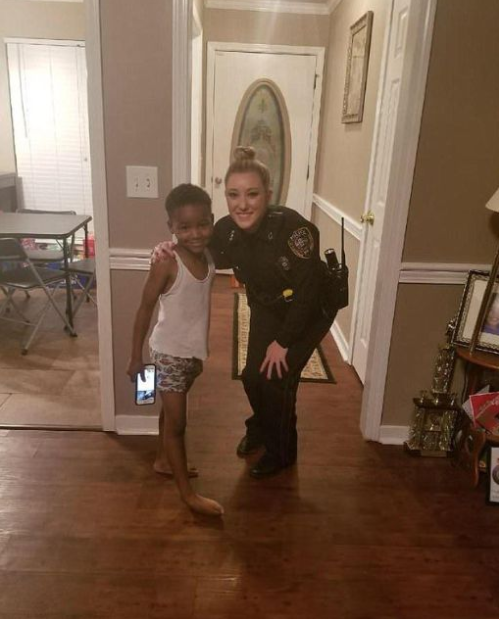
A Silent Call, A Simple Sandwich, and the Start of Something Bigger
It was around 9:30 p.m., and I had just tucked in my youngest when the phone rang. It was dispatch—911 had received a silent call from a child. No words, just an open line. I traced the call to a modest home nearby and drove out, not knowing what to expect.
A little boy opened the door—barefoot, in pajama shorts, clutching a phone like it was the most precious thing he owned. His eyes held a mix of worry and determination.
“I’m hungry,” he said. “I haven’t eaten all day.”
Inside, the house was clean but nearly empty. A jug of milk and a few ketchup packets sat lonely in the fridge. He explained that his little sister was asleep in the back room and that their mother hadn’t come home—she worked long hours at the diner.
I knelt down and asked if I could take a picture with him—just a small memento of this moment. For the first time, he smiled. I called for backup—not to make arrests, but to bring food. I couldn’t walk away from two kids sitting in silence, hungry and alone.
His name was Mateo. Eight years old. His sister, Sofia, was five and still fast asleep. He said he usually made sure she ate before bed, but tonight, they had run out of even peanut butter.
Not long after, an ambulance pulled up, its lights flashing softly in the quiet street. One of the paramedics, Rosa, stepped out carrying a brown paper bag filled with food. She greeted Mateo with such warmth that his shoulders seemed to relax.
“You must be starving,” she said, handing him a foil-wrapped sandwich.
Mateo didn’t take a bite right away. Instead, he glanced toward his sister’s room. “I should wake her.”
“No need,” Rosa said gently, placing another sandwich aside. “She can eat when she wakes.”
Finally, Mateo took a bite. Relief washed over his face, as if he had been holding his breath all day. Watching him, I felt a pang in my chest. We take food for granted when we’ve never had to go without.
Rosa and I exchanged a look—one of those quiet, unspoken understandings. We couldn’t leave these kids alone that night.
“I’ll stay with them until social services arrives,” Rosa said. “Let me try reaching their mom first.”
Mateo perked up. “She works at Joe’s Diner,” he said, but added that she wasn’t allowed to use her phone at work. I radioed dispatch to check, and sure enough, about twenty minutes later, they located a woman matching the description—panicked, frantic. She’d forgotten her phone at home and had been worried sick. When we told her the kids were safe, her relief was overwhelming.
When she returned home, social services walked her through support programs, while Rosa handed her a flyer with community meal options and local assistance. It wasn’t judgment. It was help. Real, tangible help.
As I drove away that night, the image of Mateo holding that sandwich stayed with me—a quiet reminder of how fragile some lives are, and how a single act of kindness can shift everything.
Two weeks later, Rosa showed up at the station.
This time, she wasn’t in uniform. She wore jeans and a bright yellow sweater and carried a box of homemade cookies.
“I can’t stop thinking about those kids,” she said. “So I’m doing something about it.”
And she did. Rosa gathered nurses, firefighters, and medics to start Midnight Meals—a volunteer program delivering care packages filled with snacks, toiletries, and handwritten notes to families identified by local schools as in need. The idea spread fast. Teachers donated books. Grocery stores chipped in. Teens volunteered to pack boxes. What started as a single gesture became a movement.
One cold December night, Rosa invited me on her route. One of the stops? Mateo and Sofia’s house.
I wasn’t sure they’d remember me—but when the door opened, Mateo smiled wide. He wasn’t barefoot this time. His mom stood beside him, proud and thankful.
The house looked brighter—decorations donated by a local church, a small Christmas tree in the corner, kitchen shelves filled. Rosa handed Mateo a new backpack stocked with school supplies. His eyes filled with tears as he hugged her tight.
“I’m grateful,” he whispered. “For everything.”
On the drive home, Rosa and I sat quietly for a while, then talked about why we do what we do. It can be heartbreaking. It can be heavy. But it’s moments like these—the quiet thank-yous, the bright eyes of a child—that remind us why we keep showing up.
If this story moved you, share it. Let it be a spark. Because every small act of compassion has the power to ripple out and change the world. One sandwich. One smile. One night at a time. ❤️